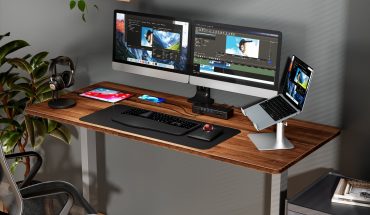He not only appreciated the tablet – he gave it a name and a special place in his home.
As one of several people involved in a potentially life-changing technology project that saw smart tablets – customized and personalized for everyone in the project – provided to seniors with dementia who were living in their own homes, he found value, reliability, even personality in the customized tablets.

Smart tablets – customized and personalized for everyone – were provided to seniors as part of a healthy living and lifestyle project in Canada. Images from Tech-Empowered Healthy Living for Seniors with Dementia project.
The tablets were developed to empower seniors to be independent, safe, and engaged in their health and well-being. The customized digital devices support various daily living activities, and important senior/caregiver interaction.
Designed for a diverse group of seniors with multiple cultural and linguistic backgrounds, including those with little or no prior experience or use of technology, the smart tablets were fully programmed for each individual’s lifestyle and health requirements.
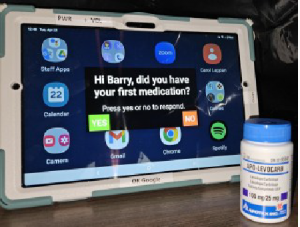
Activities of Daily Living (or ADLs) are pre-programmed in the tablet to remind a senior about their daily requirements.
For example, to remind a senior of their needed and necessary Activities of Daily Living (or ADLs), the device will give voice reminders in one of 15 supported languages.
The customized Android tablets send prompts for various important daily activities (reminders about taking medication, having meals, appointments and socializing, exercise, bedtime, etc.).
They can receive voice commands and, importantly, the tablets can also interact directly with caregivers for potential intervention if a certain senior’s tasks are not completed.
Future iterations of the tablet will see them integrated with other smart technologies in the home, such as sensors on doors in the kitchen or bathroom, to provide even more tech support for the health and well being of a live-alone senior, or someone facing the challenges of dementia.
And yes, the tablets do support gaming and entertainment uses.
During a testing and evaluation project of the customized tablet technology, more than 100 seniors (as well as caregivers and other health care professionals) in Ontario and later Alberta were provided with customized smart tablets, along with related training and support.
So important to daily routine did the tablets become that many seniors gave them a name (well, a tongue-in-cheek nickname in this case) to reflect that importance:
“The tablet has become a member of the family. It’s the Rat. There’s a little shelf I built for him. For a bed. If I don’t take my medication, the tablet reminds me and if I don’t answer, it rats me out and my wife gets told.”
The tell is possibly life-saving: the tablets interact with caregivers (the wife and/or other carers) for potential intervention if important tasks are not completed. Technology training for the managers of senior-serving organizations, the seniors themselves, and their carers was provided; multilingual manuals, and a multilingual helpline, are also available for all who use the tablets.
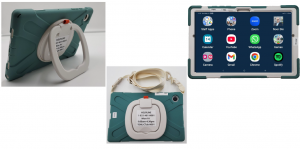
The tablet design, development and programming, as well as associated learning materials, are part of the Tech-empowered Healthy Living for Seniors with Dementia project.
The tablet design, development and programming, as well as associated learning materials, are part of the Tech-empowered Healthy Living for Seniors with Dementia project, funded by the Public Health Agency of Canada (PHAC) and The United Way of Greater Toronto (Allan Slaight Seniors Fund).
PHAC has funded several projects related to seniors’ health, people with dementia, and developing technological supports for them.
Noor Din, M.Eng, is the founder and CEO at Human Endeavour, a Canadian charitable organization based in Vaughn, Ontario, that’s working to develop technology for older adults and people with disabilities.
Din and his team designed and distributed the tablets with the support of several partner organizations, including the Regional Municipality of York, Community & Home Assistance to Seniors (CHATS), Senior Persons Living Connected, Punjabi Community Health Services and others.
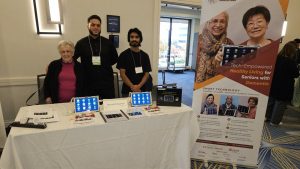
Tablets, details and findings from the Tech-Empowered Healthy Living for Seniors with Dementia project were shared during the OACAO (Older Adult Centres’ Association of Ontario) 2024 conference; this year’s conference is in November, 2025.
York University was brought in to evaluate the technology itself (so the team at Human Endeavour could make any necessary adjustments, improvements, updates or additions to the app), and to document the impact of the tablet on health behaviours, and social, emotional, and cognitive well being of those in the project.
The study was led by Dr. Lois Kamenitz, PhD, a Research Associate for York Centre for Asian Research at York University; she and Din have delivered insightful presentations about the project, in person and online.
They describe how the tablets have been programmed to interact with seniors with dementia through simplified, individualized, and customized software interfaces. Off-the-shelf tech just does not meet the needs of many seniors, they say, and in fact can be a barrier to tech-empowered living.
These customized devices, however, have been programmed for simplified communication and easy connectivity: one-touch phone calls are triggered by tapping a picture on screen such as of a family member, friend, or caregiver.
Pre-programmed calendar entries and daily schedules can help keep a senior on track by, for example, triggering and auto-running certain computer applications, like Zoom, so important online meetings and appointments are not missed.
The smart tablets are also programmed to get confirmation that one or more of those important ADLs are completed. It will auto-mail or text message a caregiver if a task is not completed (that’s the ‘Rat’ in the device).
There’s also a companion in there, and project coordinators have programmed the tablet to respond to a senior’s voice commands, when they for example ask it to launch an app like YouTube or start-up a mind-stimulating game that can be part of the health care regimen for many seniors.
Device-specific features like auto-communicating the device’s battery level or connectivity status are also built-in, as are data and voice SIM cards, special security software, and the ability for remote log-ins by support staff if a special fix or upgrade is required.
With these capabilities and more to come, the customized tablets have, as the York University project study reported, found both a home and a friend with the seniors using them: “It’s like an extra hand, a hand to help me,” says one. “Now I have a good friend; its name is TEHL,” says another.
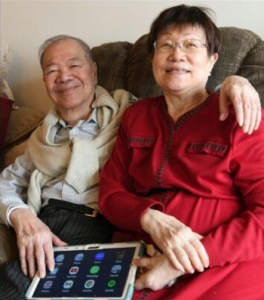
Research shows that most seniors strongly agreed or agreed that the tablet had a positive impact.
In fact, the research showed that most seniors strongly agreed or agreed that the tablet had a positive impact: 81 per cent said it helped them remember to complete daily tasks, 67 per cent found it easy to use. Self-reported feelings of tech-empowerment and comfort, personal security, even better mental activity and cognitive ability, all increased.
So, too, the capacity of caregivers to add to their roster and support more patients. A carer’s abilities increase when technology is customized and personalized. Older adults are empowered to take more control and direction over their lives – even if they get ratted out on occasion.
-30-


